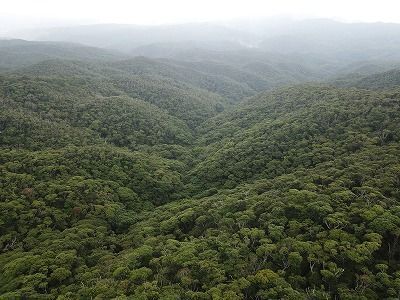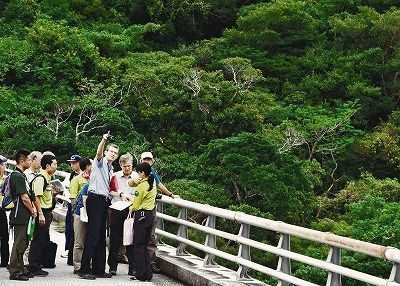IUCN defers site spanning Kagoshima and Okinawa nominated for Natural World Heritage status

The vast and abundant nature of Yambaru Forest (photograph taken via small drone on May 2 in Ogimi Village)
May 4, 2018 Ryukyu Shimpo online edition
In the early morning on May 4 in Japan, the International Union for Conservation of Nature (IUCN), an advisory body to the United Nations Educational Scientific and Cultural Organization (UNESCO), deferred the Japanese government’s nomination for World Natural Heritage status for a site consisting of Amami Oshima, Tokuno Island, a northern part of Okinawa Island, and Iriomote Island. The IUCN has recommended a deferral, requesting important changes to the nomination.
The IUCN pointed out that concerns remain, including the sustainability of the proposed site’s ecosystem since it is divided into minute sections.
It has requested that the site’s components be re-selected, among other actions.
In an interview at the Ministry of the Environment (MOE), Naohisa Okuda, head of the Biodiversity Policy Division of the MOE, said, “We will earnestly heed this response and consider how to handle the situation from here on out.”
The IUCN will make its final decision at the UNESCO World Heritage Committee session in Bahrain, which starts on June 24.
This is the first time that a property in Japan proposed for World Natural Heritage status was deferred.
The government will revise its nomination, but now it is most likely that the initial goal of this site achieving World Natural Heritage status by summer 2018 will not be realized.
The MOE made the proposal with confidence, and the strict nature of World Natural Heritage selection was “unforeseen,” according to a person involved with the nomination file.

On October 16, 2017, IUCN field evaluators inspect Yambaru Forest in order to inform a decision regarding its nomination for World Natural Heritage status.
The IUCN has the option to recommend the “inscription,” “referral,” “deferral,” or “non inscription” of sites nominated for World Natural Heritage status. Because the IUCN deferred the nomination and requested a fundamental revision of the file, upon resubmission of the nomination, the IUCN will also need to revisit processes such as the field inspection.
From this point inscription on the World Heritage List takes more time than revisiting deliberations in the “referral” process, and will require at least several more years to achieve.
According to Okuda, the IUCN raised points such as that portions of the U.S. military Northern Training Area (NTA) returned in December 2016 were not included in the government’s proposal, so the IUCN recommended many amendments.
Okuda said that even if the government’s approach is called overly optimistic, that cannot be helped now.
On the other hand, he said that he does not think the influence of the NTA will negatively affect assessments of proposed areas near the NTA.
The land area proposed for World Natural Heritage status measures about 38,000 hectares, and includes a northern portion of Okinawa Island, Iriomote Island, and Kagoshima Prefecture’s islands Amami Oshima and Tokunoshima.
There are many endemic species living in the region’s subtropical evergreen forests, so due to the importance of protecting the site’s biodiversity, last year in February the Japanese government submitted a nomination file for World Natural Heritage status for this site.
(English translation by T&CT and Erin Jones)
Previous Article:Okinawa International School starts offering Shimakutuba classes
Next Article:Chikako Yamashiro receives prize at international film festival for Mud Man, which depicts the anguish of bearing military bases
[Similar Articles]
- Japanese government to renominate Amami-Okinawa site for World Natural Heritage status
- Japan to resubmit Amami-Okinawa site nomination for World Natural Heritage List inscription
- World Natural Heritage Site evaluations in Okinawa
- Biodiverse island areas in northern Okinawa nominated for UNESCO World Natural Heritage
- Amami, Okinawa to re-nominate world heritage sites for review next summer
 Webcam(Kokusai Street)
Webcam(Kokusai Street)


